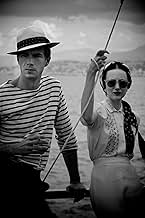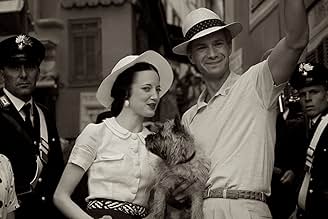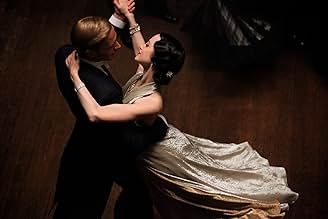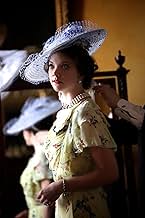The affair between King Edward VIII and American divorcée Wallis Simpson, and a contemporary romance between a married woman and a Russian security guard.The affair between King Edward VIII and American divorcée Wallis Simpson, and a contemporary romance between a married woman and a Russian security guard.The affair between King Edward VIII and American divorcée Wallis Simpson, and a contemporary romance between a married woman and a Russian security guard.
- Nominated for 1 Oscar
- 4 wins & 6 nominations total
- Director
- Writers
- All cast & crew
- Production, box office & more at IMDbPro
6.214K
1
2
3
4
5
6
7
8
9
10
Featured reviews
A fantasy with realistic (and historical) roots...well done!
W.E. (2011)
Don't even think about who directed this. Think of it as a multi-layered, multi-era epic centering on the marriage of King Edward and his American love, Wallis Simpson. He's the English king who abdicated for love. But this is the story of the love, Wallis, the woman who gave up as much as the king did, or so the thrust of the movie suggests.
It's rather good! It mixes a bit of fantasizing with a contemporary woman, Wally, finding her obsession with the Wallis of history (1930s) is more than coincidence. The narrative flips between several parts of the royal story before WWII and the contemporary version, which includes a budding relationship with a guard at an exhibition of Wallis Simpson memorabilia.
Whether you find either story convincing doesn't matter. One of them is of course based on history, and is interesting if you don't already know the facts. The other is an echo of the same, with the woman having to become strong and independent just as her earlier namesake did.
What is most interesting is the way the two stories are inter-spliced, including some scenes where the two times zones are mixed (apparently in Wally's head, but it's very real to the audience). We start to see how often and completely women are stuck in situations they would not choose if they knew ahead of time. It's about independence, yes, but also failure to be independent and the consequences. And maybe it's about learning a little from history.
The director? Madonna. Yes, the singer from Michigan. The director of the terrible bomb "Filth and Wisdom." Here there is some real cinematic intelligence. It's a good movie. Flawed, a bit longer than it needs to be, a bit forced in the layering of stories, but well acted and conceived.
Don't even think about who directed this. Think of it as a multi-layered, multi-era epic centering on the marriage of King Edward and his American love, Wallis Simpson. He's the English king who abdicated for love. But this is the story of the love, Wallis, the woman who gave up as much as the king did, or so the thrust of the movie suggests.
It's rather good! It mixes a bit of fantasizing with a contemporary woman, Wally, finding her obsession with the Wallis of history (1930s) is more than coincidence. The narrative flips between several parts of the royal story before WWII and the contemporary version, which includes a budding relationship with a guard at an exhibition of Wallis Simpson memorabilia.
Whether you find either story convincing doesn't matter. One of them is of course based on history, and is interesting if you don't already know the facts. The other is an echo of the same, with the woman having to become strong and independent just as her earlier namesake did.
What is most interesting is the way the two stories are inter-spliced, including some scenes where the two times zones are mixed (apparently in Wally's head, but it's very real to the audience). We start to see how often and completely women are stuck in situations they would not choose if they knew ahead of time. It's about independence, yes, but also failure to be independent and the consequences. And maybe it's about learning a little from history.
The director? Madonna. Yes, the singer from Michigan. The director of the terrible bomb "Filth and Wisdom." Here there is some real cinematic intelligence. It's a good movie. Flawed, a bit longer than it needs to be, a bit forced in the layering of stories, but well acted and conceived.
Almost, yet not quite.
W.E. is one of three biopics I have seen this year, after The Iron Lady and J Edgar. Of the three I think W.E. is probably the best, but all three tread the path of the mediocre. What W.E. gets right is Wallis Simpson, Riseborough is fantastic in the lead role and has great chemistry with James D'Arcy. The biggest problem with the film is the the second tier of the romance with Abbie Cornish's Wally Winthrop, though the romance picks up momentum around the one hour mark, it slows down the pace of the Wallis Simpson segments.
The script has high and low notes, the romance at times is reduced sappiness, but these are forgivable even when they are at there worst. What is probably the biggest weakness in W.E. is the often used close up hand held camera shots. The occasional one works nicely, but these shots are put in far too often and take you out of the story. In most cases the camera work could have been more simplistic, it too often feels erratic which isn't good in the more tender moments of the film.
The music in W.E. is beautiful and the addition of "Masterpiece" in the credits is a lovely song to go side by side with the film. However sometimes the music is a little over powering, once again just a case of less is more. The much discussed and derided scene with Wallis dancing the Charleston with a tribesman to The Sex Pistols "pretty Vacant", I really liked. I felt the scene was a fun and good way to show how frivolous the character could be, using the modern day Wally's imagination to keep the scene from feeling alien.
Undoubtedly the best part of W.E. is the costume and lighting. The attention to detail in this department is incredible. Every costume looks stunning and is meticulously put together down to the nearest diamond, and the lighting makes the landscapes almost feel like paintings it really is stunning.
All in all W.E. is a great attempt from Madonna to craft a stunning looking film, though the storytelling can be muddled and the film takes around 40 minutes to really get going, its once again forgivable. Historical inaccuracies put aside would have made this film a 7, but not exploring the Nazi element could have made this so much more interesting. The negative reviews of this film aren't looking at it from fair perspective and anyone with half a brain can see though not amazing, W.E. is at least half decent and for a directors second film pretty damn good.
The script has high and low notes, the romance at times is reduced sappiness, but these are forgivable even when they are at there worst. What is probably the biggest weakness in W.E. is the often used close up hand held camera shots. The occasional one works nicely, but these shots are put in far too often and take you out of the story. In most cases the camera work could have been more simplistic, it too often feels erratic which isn't good in the more tender moments of the film.
The music in W.E. is beautiful and the addition of "Masterpiece" in the credits is a lovely song to go side by side with the film. However sometimes the music is a little over powering, once again just a case of less is more. The much discussed and derided scene with Wallis dancing the Charleston with a tribesman to The Sex Pistols "pretty Vacant", I really liked. I felt the scene was a fun and good way to show how frivolous the character could be, using the modern day Wally's imagination to keep the scene from feeling alien.
Undoubtedly the best part of W.E. is the costume and lighting. The attention to detail in this department is incredible. Every costume looks stunning and is meticulously put together down to the nearest diamond, and the lighting makes the landscapes almost feel like paintings it really is stunning.
All in all W.E. is a great attempt from Madonna to craft a stunning looking film, though the storytelling can be muddled and the film takes around 40 minutes to really get going, its once again forgivable. Historical inaccuracies put aside would have made this film a 7, but not exploring the Nazi element could have made this so much more interesting. The negative reviews of this film aren't looking at it from fair perspective and anyone with half a brain can see though not amazing, W.E. is at least half decent and for a directors second film pretty damn good.
Fantastic, compelling...
I will not be revealing any spoilers. I just want to highlight the fact that I can now confirm for myself that critics are jaded and they will write off anything Madonna does in the film business. That is not to say most of her previous works weren't dismal at best, but I always felt they weren't as bad as critics bashed.
However, we're here to discuss W.E. A film that Madonna does not star in and that may just be the brilliance of it all. I screened it last night after winning a contest and I must say, as a Madonna fan, I walked in with the assumption that I wouldn't like the movie but I would search for little things that I could enjoy and emphasize those things. That had to be the last thing in the world I did once the film commenced. Even in the same room with Madonna and other fashionistas, celebrities and artists, I completely forgot where I was and I soon found myself captivated by the story.
The intertwining of the old and new, historical loosely based romance with a modern romance, music old and new was brilliantly executed by Madonna. The film really emphasized how the general public scrutinize public figures and demonize others without a clear understanding of who they are and how politics can destroy the chance of love and how King Edward would ultimately not have that.
Intertwined with the modern tale of a New York City woman who's fascinated by the story, there are flashbacks that go through the delicate history of the royal family in the particular time that Wallis Simpson, then married, met King Edward.. It is not a fact-by-fact story. It is an attempt to take a look at things from a different perspective because after all there are two sides to every story, if not more than two sides.
Although set design, location and costume design were unbelievable, I will not speak further on it because critics said that that was the only thing good about the film so I'll let that speak for itself.
Every character was played and executed brilliantly and it was just a captivating story from beginning to end. I take pride in my love for Madonna but I also take pride in my love for film and I walked in knowing I wouldn't lie to myself. If I liked it, I liked it. If I loved it, then so be it. If I hated it, oh well.
Fortunately, I found that everyone in the audience was pleasantly surprised, almost as if they were cheering on the fact that it will be seen for what it is. That no one has to defend it. Leave it to the film-goer to make that desicion.
The camera work was beautiful, slow but intermixed with a haunting score and pivotal performances. I really hope people watch it with an open mind and forget Madonna directed it. At least until the credits roll and her new song Masterpiece begins and you remember why we love Madonna in the first place. Her music is profound and the song Masterpiece is a beautiful closer to the film.
After the film, everyone was energized and the buzz carried out into the halls where people stood discussing the film. I can't wait to re-watch it with my friends on Friday for its limited release and then once more at opening night on February 3rd.
I will be buying this film for my DVD collection. It's worth it and that's more than I thought I'd ever say about it.
***1/2(out of 5)
However, we're here to discuss W.E. A film that Madonna does not star in and that may just be the brilliance of it all. I screened it last night after winning a contest and I must say, as a Madonna fan, I walked in with the assumption that I wouldn't like the movie but I would search for little things that I could enjoy and emphasize those things. That had to be the last thing in the world I did once the film commenced. Even in the same room with Madonna and other fashionistas, celebrities and artists, I completely forgot where I was and I soon found myself captivated by the story.
The intertwining of the old and new, historical loosely based romance with a modern romance, music old and new was brilliantly executed by Madonna. The film really emphasized how the general public scrutinize public figures and demonize others without a clear understanding of who they are and how politics can destroy the chance of love and how King Edward would ultimately not have that.
Intertwined with the modern tale of a New York City woman who's fascinated by the story, there are flashbacks that go through the delicate history of the royal family in the particular time that Wallis Simpson, then married, met King Edward.. It is not a fact-by-fact story. It is an attempt to take a look at things from a different perspective because after all there are two sides to every story, if not more than two sides.
Although set design, location and costume design were unbelievable, I will not speak further on it because critics said that that was the only thing good about the film so I'll let that speak for itself.
Every character was played and executed brilliantly and it was just a captivating story from beginning to end. I take pride in my love for Madonna but I also take pride in my love for film and I walked in knowing I wouldn't lie to myself. If I liked it, I liked it. If I loved it, then so be it. If I hated it, oh well.
Fortunately, I found that everyone in the audience was pleasantly surprised, almost as if they were cheering on the fact that it will be seen for what it is. That no one has to defend it. Leave it to the film-goer to make that desicion.
The camera work was beautiful, slow but intermixed with a haunting score and pivotal performances. I really hope people watch it with an open mind and forget Madonna directed it. At least until the credits roll and her new song Masterpiece begins and you remember why we love Madonna in the first place. Her music is profound and the song Masterpiece is a beautiful closer to the film.
After the film, everyone was energized and the buzz carried out into the halls where people stood discussing the film. I can't wait to re-watch it with my friends on Friday for its limited release and then once more at opening night on February 3rd.
I will be buying this film for my DVD collection. It's worth it and that's more than I thought I'd ever say about it.
***1/2(out of 5)
a directing/writing effort of Madonna
I suppose there is the germ of a good idea here, and 2011's "W.E." is not unsuccessful. As a directing effort by Madonna, it's okay. And you have to give her credit since she had to know everyone would be gunning for her.
In 1998, the estate of the Duke and Duchess of Windsor goes up for auction. One person particularly interested in it is Wally Winthrop (Abbie Cornish), who is very taken with the love story between Wallis Simpson and the Duke of Windsor, and particularly Wallis' life and other marriages. The film takes us through the courtship and marriage of the Duke and Duchess as well as Wally's disintegrating marriage to William, and then her relationship with the Soviet security guard she meets at the auction house.
Personally I've never found anything romantic or sympathetic about Wallis and David. I think Wallis was a great excuse for David to duck responsibility and heap it onto his stammering brother. And neither he nor Wallis thought about what they were going to do once they were married. And what did they do? Roamed the world, showing up at a location when it was in season, and making friends who would write books about them after they died. By the time the couple realized what they had done, it was too late. No breaking up the great romance.
Nevertheless, as many times as their story has been told, it's still fascinating, and much more interesting than the marriage of Wally Winthrop and her husband. Not to mention, there is a fantastic performance by Andrea Risborough as Wallis. As Edward, James D'Arcy is incredibly dashing and attractive. It's really the stronger story, and Madonna might have been better off just telling their tale, using a different point of view than others have in the past.
The moral seems to be to take a risk and go for happiness. It's a fine moral; I'm just not sure I would use the Duke and Duchess of Windsor as inspiration. Was theirs a great love story? I'm sure it was, and no doubt the Duke's death hit the Duchess very hard. But they were human beings who undoubtedly fought, took one another for granted, and had some misgivings. And that's the big problem with idealizing any romance - in the end, the people we idealize are too much like us.
In 1998, the estate of the Duke and Duchess of Windsor goes up for auction. One person particularly interested in it is Wally Winthrop (Abbie Cornish), who is very taken with the love story between Wallis Simpson and the Duke of Windsor, and particularly Wallis' life and other marriages. The film takes us through the courtship and marriage of the Duke and Duchess as well as Wally's disintegrating marriage to William, and then her relationship with the Soviet security guard she meets at the auction house.
Personally I've never found anything romantic or sympathetic about Wallis and David. I think Wallis was a great excuse for David to duck responsibility and heap it onto his stammering brother. And neither he nor Wallis thought about what they were going to do once they were married. And what did they do? Roamed the world, showing up at a location when it was in season, and making friends who would write books about them after they died. By the time the couple realized what they had done, it was too late. No breaking up the great romance.
Nevertheless, as many times as their story has been told, it's still fascinating, and much more interesting than the marriage of Wally Winthrop and her husband. Not to mention, there is a fantastic performance by Andrea Risborough as Wallis. As Edward, James D'Arcy is incredibly dashing and attractive. It's really the stronger story, and Madonna might have been better off just telling their tale, using a different point of view than others have in the past.
The moral seems to be to take a risk and go for happiness. It's a fine moral; I'm just not sure I would use the Duke and Duchess of Windsor as inspiration. Was theirs a great love story? I'm sure it was, and no doubt the Duke's death hit the Duchess very hard. But they were human beings who undoubtedly fought, took one another for granted, and had some misgivings. And that's the big problem with idealizing any romance - in the end, the people we idealize are too much like us.
A Semi-Noble Failure
Having finally opened in the UK, I've now had the opportunity to watch 'W.E.', having followed its coverage to this point with interest. I can't, in all honestly, say that this is a good movie. I'll back the common positives and reiterate that it looks amazing and Andrea Riseborough is wonderful in it. The score, while lovely, is over- powering at times - Madonna is obviously terrified of silence!
I went with the movie quite happily for the first hour. The Wallis and Edward scenes are effective (I thought the dizzying/choppy camera work worked really well contrasting with the vintage images) and reminded me quite a bit of Stephen Fry's movie "Bright Young Things". But they had absolutely zero dramatic tension. Largely, this was due to the fact that they weren't chronological, but also it was because (to my horror) they almost seemed there to serve the modern day story, rather than vice versa.
And as for those modern day parts ... well ... Firstly, I'll say that I didn't think the concept was bad and it had potential. However, they needed to be trimmed by about three quarters. Christ, did they ever go on. The dialogue was serviceable, at best, and toe-curling at worst. The character of Wally was about as engaging as a paper clip and that was largely due to Abby Cornish's lifeless performance. Honestly, I wanted to scream at the screen, "Stop whispering all the time and TALK, woman!" That said, if the movie had only cut to these scenes every so often and used them as well-timed interjections, rather than as a story worthy of screen time in their own right, it would have been more bearable.
The film really lost me in the second hour when I realised it had used up all its party tricks and it was obvious where it was going. (And, no, I don't mean the Wallis/Edward story arch, but how it was going to contrast the two tales, and what the oh-so-obvious climax was going to be.) By the end, I couldn't wait for it to finish.
There are some lovely scenes, though, and several nice touches throughout. But while the infamous 'Pretty Vacant' sequence is probably trying to say profound things about Wallis having a punk spirit, it feels rather out of place. (It's fun, though, I'll give it that.)
So, really, it's nowhere near the one star disaster many are claiming. And I, genuinely, can't see why anyone could charge it would be, other than to appear 'cool' to knock Madge. It's got too much going for it, for that.
But the reason I said 'semi-noble failure' is because, while I think it had some ambition, it's indulgent to a fault. At least twenty minutes of this movie are taken up by Abby Cornish wandering around Sothebys, exchanging in vacant platitudes with the Russian security guard, or looking blandly at something we're told should be exciting by the volume of the score. And, I guess, the blame for including such non-interesting stuff must lie with the movie's director.
I went with the movie quite happily for the first hour. The Wallis and Edward scenes are effective (I thought the dizzying/choppy camera work worked really well contrasting with the vintage images) and reminded me quite a bit of Stephen Fry's movie "Bright Young Things". But they had absolutely zero dramatic tension. Largely, this was due to the fact that they weren't chronological, but also it was because (to my horror) they almost seemed there to serve the modern day story, rather than vice versa.
And as for those modern day parts ... well ... Firstly, I'll say that I didn't think the concept was bad and it had potential. However, they needed to be trimmed by about three quarters. Christ, did they ever go on. The dialogue was serviceable, at best, and toe-curling at worst. The character of Wally was about as engaging as a paper clip and that was largely due to Abby Cornish's lifeless performance. Honestly, I wanted to scream at the screen, "Stop whispering all the time and TALK, woman!" That said, if the movie had only cut to these scenes every so often and used them as well-timed interjections, rather than as a story worthy of screen time in their own right, it would have been more bearable.
The film really lost me in the second hour when I realised it had used up all its party tricks and it was obvious where it was going. (And, no, I don't mean the Wallis/Edward story arch, but how it was going to contrast the two tales, and what the oh-so-obvious climax was going to be.) By the end, I couldn't wait for it to finish.
There are some lovely scenes, though, and several nice touches throughout. But while the infamous 'Pretty Vacant' sequence is probably trying to say profound things about Wallis having a punk spirit, it feels rather out of place. (It's fun, though, I'll give it that.)
So, really, it's nowhere near the one star disaster many are claiming. And I, genuinely, can't see why anyone could charge it would be, other than to appear 'cool' to knock Madge. It's got too much going for it, for that.
But the reason I said 'semi-noble failure' is because, while I think it had some ambition, it's indulgent to a fault. At least twenty minutes of this movie are taken up by Abby Cornish wandering around Sothebys, exchanging in vacant platitudes with the Russian security guard, or looking blandly at something we're told should be exciting by the volume of the score. And, I guess, the blame for including such non-interesting stuff must lie with the movie's director.
Did you know
- TriviaFashion house Christian Dior recreated three dresses for this film that it had previously made for the real Wallis Simpson.
- GoofsIn the newsreel scene from 1936 showing the funeral procession of Edward's father the King, the voiceover announcer says that "King George the Third has died and the nation mourns". It should of course have been King George the Fifth.
- Quotes
Wallis Simpson: Darling, they can't hurt you if you don't let them.
- ConnectionsFeatured in Breakfast: Episode dated 3 September 2011 (2011)
- SoundtracksKarin
Written by Christoph Clöser, Morten Gass
Performed by Bohren & Der Club of Gore
Published by Manuskript © (P) Bohren & Der Club of Gore released under exclusive license by [Pias] Recordings 2008
- How long is W.E.?Powered by Alexa
Details
- Release date
- Countries of origin
- Official sites
- Languages
- Also known as
- Chuyện Tình Thế Kỷ
- Filming locations
- Production companies
- See more company credits at IMDbPro
Box office
- Budget
- $15,000,000 (estimated)
- Gross US & Canada
- $583,455
- Opening weekend US & Canada
- $47,074
- Feb 5, 2012
- Gross worldwide
- $2,042,203
- Runtime
- 1h 59m(119 min)
- Color
- Sound mix
- Aspect ratio
- 2.35 : 1
Contribute to this page
Suggest an edit or add missing content















































